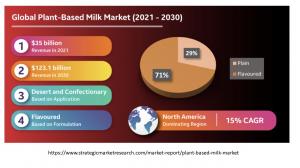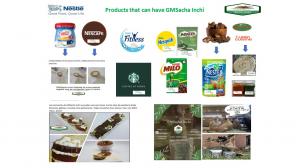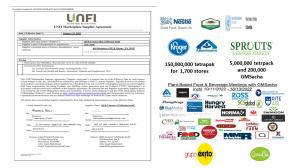GMSacha Inchi $QEDN met with Nestle on April 10, 2023 to discuss a possible cobranding
GMSacha Inchi $QEDN met with Nestle on April 10, 2023 to discuss a possible cobranding between Nestle and GMSacha Inchi.
QEDN GMSacha Inchi (OTCMKTS:QEDN)
MEDELLIN, ANTIOQUIA, COLOMBIA, April 11, 2023/EINPresswire.com/ -- On January 17, 2020, GMS $QEDN had the first virtual meeting with executives of Nestle Colombia. Since then, GMS $QEDN signed an NDA and had several meetings and a visit from Nestle on February 14, 2020.
GMSacha Inchi $QEDN has developed several prototypes of products with GMSacha Inchi that can be used under the brand name Nestle. For example: Milo with GMSacha Inchi.
Tasty and trusted, Milo brand is the world’s leading chocolate malt beverage that can be prepared with hot or cold milk or water. It offers essential vitamins and minerals to meet the nutrition and energy demands of young bodies and minds.
Launched in Australia in the early 1930s, the Milo brand takes kids' development seriously. It has long been known as an energy beverage strongly associated with sports and good health.
https://www.nestle.com/brands/drinks/milo
On April 10, 2023, GMSacha Inchi $QEDN had another meeting to discuss the possibility of a cobranding between both companies.
During this meeting, GMS $QEDN provided Nestle with a complete presentation of all the different products that can be made with GMSacha Inchi for Nestle.
During the meeting GMS provided the following information to Nestle:
1- GMSacha Inchi $QEDN is already a registered brand with recognition.
2- GMS $QEDN has designed and developed the equipment specifically for Sacha Inchi and the technology to manufacture GMSacha Inchi beverages, GMSacha Inchi powder, GMSacha Inchi snacks, GMSacha Inchi premix, GMSacha Inchi pet line, GMSacha Inchi infusion and many other products.
3- GMSacha Inchi has a research and development department dedicated to developing products made with Sacha Inchi and other healthy products like garbanzo beans, lentils, peas and much more.
4- GMSacha Inchi has contracts with enough farmers to grow enough Sacha Inchi to manufacture enough GMSacha Inchi beverages to export to the USA, Canada, Colombia, and other markets worldwide.
5- GMSacha Inchi has the permits to manufacture and export GMSacha Inchi products.
Nestle requested the following from GMS $QEDN:
1- Top priority products GMS $QEDN believes that Nestle and GMS $QEDN could bring into US, Canadian, Colombian, and other markets.
2- The budget needed for the cobranding between both companies.
3- Steps to follow to start this possible joint venture.
According to Strategic Market Research: “The global plant-based milk market will witness a robust CAGR of 15%, valued at $35 billion in 2021, expected to appreciate and reach $123.1 billion by 2030, confirms Strategic Market Research.
North America witnessed a sizeable market share of over 40% in 2021. Plant-based milk is a beverage manufactured from plants resembling milk in color. Plant-based milk is beverages obtained from non-dairy sources, flavored and scented with water-based plant extracts. Plant-based milk is used as a milk substitute and frequently has a creamy texture on the tongue. There are roughly 17 different kinds of plant milk; the most popular ones globally are Soy, almond, coconut, and oat. The term "milk-like plant liquid" has been used to describe beverages made from plants since the 13th century.
https://www.strategicmarketresearch.com/market-report/plant-based-milk-market
Most plant-based beverages or milks are made from Almond but are high in sugar, sodium, and calories. Consumers are looking for low calories and high proteins. Manufacturers are trying to bring new versions of almond beverages into the market that are lower in calories, sugar, and sodium, but because almonds have only 21 grams of protein the new versions of almond beverages are low in protein less than 0.5 grams.
A single almond takes about three and half liters of water to produce. Most almonds – an estimated 82 per cent – are grown in drought-afflicted California, where it constitutes a multibillion-dollar industry. The number of almond orchards has doubled in the last 20 years in California. It takes 7 to 12 years to grow an almond tree. Almond trees are native to Asia not California.
These large, industrialized and mono-crop farming practices are not good for biodiversity, while the year-round irrigation required for almond trees puts huge pressure on a finite resource. Water is diverted from rivers for farming, which can negatively impact fish, with reports warning of endangered salmon in California at risk from low water levels.
Bees are another concern. Huge colonies are brought in to pollinate almond farms, but they often die from the pesticides.
Add to this the transportation costs and the packaging, and a packet of almonds becomes an extremely resource-intensive product.
https://www.irishtimes.com/life-and-style/food-and-drink/are-almonds-bad-for-the-environment-1.4138427
Sacha inchi starts producing in 7 months and produces seeds every 15 days. Sacha Inchi is native to the amazon, doesn’t require lots of water. Many of the farmers that grow sacha inchi are making crop substitutions from illegal crops like Coca leaves to sacha inchi. Sacha Inchi is a very important solution to illegal crops in Colombia. The ministry of agriculture wants to grow 5,000 hectares of sacha inchi in PDET areas in Colombia that is enough sacha inchi to penetrate 5% of the world market of plant-based beverages o 200,000,000 tetrapak per year.
GMSacha Inchi with the possible help of Nestle wants to penetrate at least 5 % of the plant-based beverage market by 2023- 2026 and then grow at a 2% to 5% rate every year.
GMSacha Inchi $QEDN believes that the GMSacha Inchi beverage could be a leader in the plant-based beverage market because is the only beverage that has 29 grams of protein all 9 essential amino acids and Omega 3,6,9.
A safe harbor for forward-looking statements is provided by the Private Securities Litigation Reform Act of 1995 (Reform Act of 1995). The Reform Act of 1995 was adopted to encourage such forward-looking statements without the threat of litigation, provided those statements are identified as forward-looking and are accompanied by meaningful cautionary statements identifying important factors that could cause the actual results to differ materially from those projected in the statement. Forward-looking statements have been and will be made in written documents and oral presentations of QED Connect (GMS) and its subsidiaries. Such statements are based on management beliefs, as well as assumptions made by and information currently available to management.
Katharina Nanny Bahnsen
GMSacha Inchi QEDN
3103791039 ext.
email us here
Visit us on social media:
Facebook
Twitter
LinkedIn
Other
CEO interview with Jane King at New to the Street
Legal Disclaimer:
EIN Presswire provides this news content "as is" without warranty of any kind. We do not accept any responsibility or liability for the accuracy, content, images, videos, licenses, completeness, legality, or reliability of the information contained in this article. If you have any complaints or copyright issues related to this article, kindly contact the author above.



